Items
Mediator is exactly
Survivor Stories
-
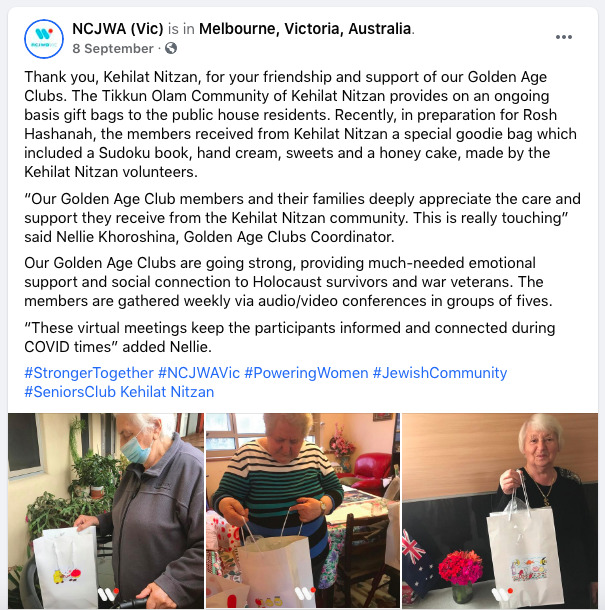 2020-09-08
2020-09-08Jewish Melbourne: NCJWA (Vic) Golden Age club activities
"Thank you, Kehilat Nitzan, for your friendship and support of our Golden Age Clubs. The Tikkun Olam Community of Kehilat Nitzan provides on an ongoing basis gift bags to the public house residents. Recently, in preparation for Rosh Hashanah, the members received from Kehilat Nitzan a special goodie bag which included a Sudoku book, hand cream, sweets and a honey cake, made by the Kehilat Nitzan volunteers. “Our Golden Age Club members and their families deeply appreciate the care and support they receive from the Kehilat Nitzan community. This is really touching” said Nellie Khoroshina, Golden Age Clubs Coordinator. Our Golden Age Clubs are going strong, providing much-needed emotional support and social connection to Holocaust survivors and war veterans. The members are gathered weekly via audio/video conferences in groups of fives. “These virtual meetings keep the participants informed and connected during COVID times” added Nellie." -
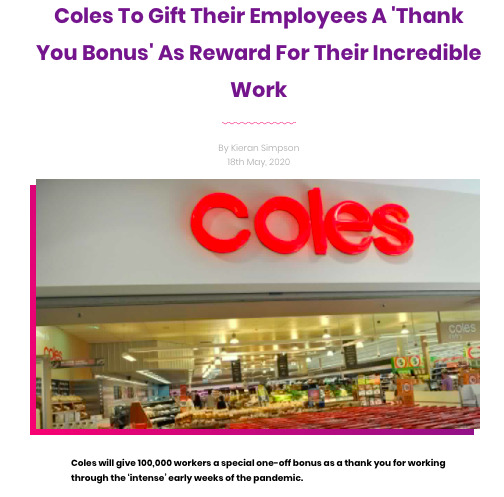 2020-05-18
2020-05-18Working at a bottle shop during COVID19
Throughout the pandemic I worked in a bottle shop owned by Coles in South Melbourne. Sales increased dramatically during the pandemic for two reasons. Firstly, people were worried about Dan Andrews closing bottle shops during lockdown. Secondly, because bars and venues were closing, people had to source their own alcohol. During the interim period when people were discussing what the stage 3 and 4 lockdown would look like customers would come into the shop and ask if we were considered an ‘essential service’. I would respond with “I assume we’re considered essential,” “how would you survive without booze?” and “you’d know more than we do.” During this period of time it seemed like everyone knew a friend or an acquaintance of a friend who was in politics and sharing information about COVID lockdown meetings and what the next stage would involve. The uncertainty of not knowing if I’d be working next week was stressful and caused anxiety and it also caused me to panic buy wine (most of which was not touched). Nonetheless, we stayed open throughout all lockdowns and acquired new customers. During lockdown our sales increased on cocktail ingredients such as triple sec and campari because people started making cocktails at home. During the pandemic customers seemed to have more time to chat and browse and wanted to try new products. but this could also be because they liked the excuse to stay out of home for longer. As well, Coles gave employees who worked from March to May 2020 a one-off thank you bonus for working during the hardest weeks of the pandemic. Working during a pandemic had highs and lows, I was grateful that I didn’t live with my family, so I couldn’t bring home to virus, but it was hard juggling extra hours at work around online uni and other aspects of life. HIST30060 -
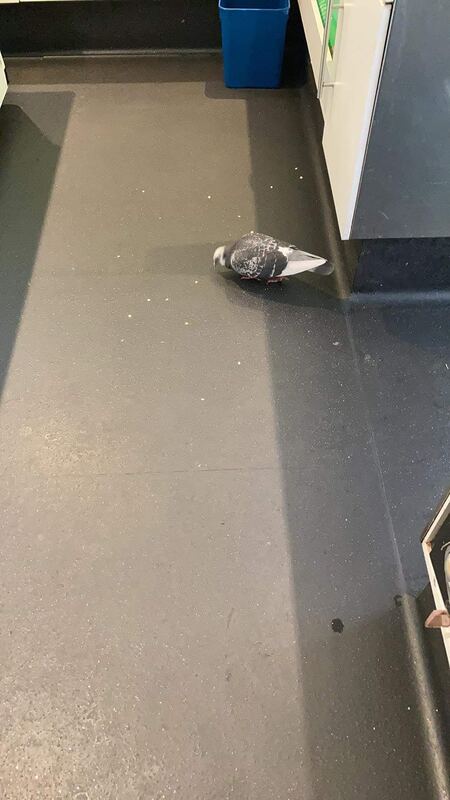 2020-08-18
2020-08-18Image of a pigeon in store
HIST30060 Despite quarantine restrictions, I was still able to work at my fast food job in the CBD. Pictured here is a pigeon who would come into our store looking for food in the quietest parts of the day, which were almost always due to the lack of people in the city. Whilst working in the city, I realised that most urban birds, including pigeons and seagulls, became very confident during the stricter quarantine periods. The lack of activity in the city meant they were not receiving the usual scraps they would receive from those travelling to and from their desk jobs. The birds became bold with their interactions with those who were coming to the city in order to gain the small amount of food they needed to survive. This small pigeon in our store is a good example of this. He would waltz in and munch on the oats that would land on our floor before we had time to clean them. Despite repeated attempts to shoo him outside, he would often walk around our floor before meandering outside again. -
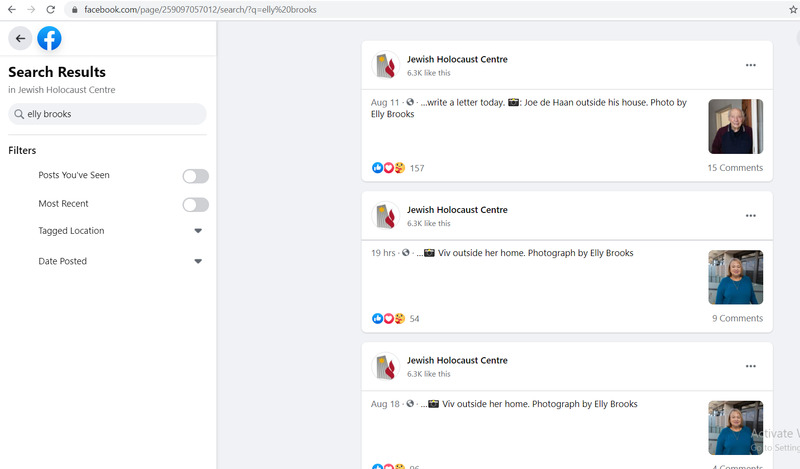 2020-07
2020-07Jewish Melbourne: Survivors in Isolation - A different isolation
In July Elly Brooks - who is a photographer, member of the Board of the Jewish Holocaust Centre, and President of Friends of JHC - worked with the JHC to take photos of Holocaust survivors at their front doors. In line with Melbourne's lockdown procedures, the JHC was closed, and everyone was required to be at home, so these photos show the survivors as they stayed home to isolate. Elly Brooks reflected: "Holocaust Survivors and other elderly people are perhaps more impacted in this time of covid isolation than younger people as they are confined to their homes under the country’s partial lockdown and many find themselves far from their usual network of support. What shines through this series of images of Holocaust survivors in Melbourne is a strong spirit to overcome adversity, with an understanding that it is a temporary. Most of the survivors pictured, have been coming to the Jewish Holocaust Centre for many years, presenting their testimony to students and the general public and being connected to a community. In early March, when the pandemic was becoming an inevitable danger in Melbourne, the survivors were the first to be asked to stay home, away from the JHC. For some, the memories of our survivors are always there just below the surface and this enforced isolation makes our elderly feel vulnerable and threatens their independence. As a photographer, I wanted to capture the strength and dignity of survivors as they posed on their doorsteps of their homes during this lockdown.As a longtime friend to most of them, I have been missing them so it also gave me good reason to visit them and hear their wise words. For some the virus brought back memories: “that feeling of dread all the time. You never know if other people on the street are going to give you the virus, or they were going to turn you in to the Gestapo because you were a Jew.” Each survivor had their photo taken and they each contributed a reflection: Joe de Hann: I keep occupied by reading and cooking for myself. I have been alone a long time so I am used to being by myself but I miss the Holocaust Centre and the people Henry Buch: I feel unchallenged and lack motivation. My son visits but my daughter is in isolation. Jewish Care assists me but when you are isolated like this memories and worries come back Irma Hanner: “It’s not a war! “We are in a lucky country but even so we must be aware of and call out racism. The extremes of politics both right and left sides are bad. “I miss my work at The Jewish Holocaust Centre” Gisa Frayman: I am lucky that my children come to visit which means that I am not alone. We talk everyday on the phone and as long as they are well, they visit me John Lamovie: I have a large family and before this isolation they visited often but not now. That is the hardest for me at this time.Life during the pandemic ihas an unsettling resonance, especially the isolation from family members. Some of my family drive by to wave to me. A couple of family deaths were very hard to reconcile at this strange time of isolation. I attended a virtual funeral. Overall I feel lucky and nothing to complain about. Abe Goldberg: It’s not a war but it is very hard for me because my wife Cesia is in care and I cannot visit her. That is devastating for me not being allowed to visit her. We have been together so many years Sarah Saaroni: I’m perfectly fine and see my family from a distance. I am fully occupied and well looked after. Henri Korn: Life during the pandemic is unsettling especially the isolation from my friends and family. “It pains me that I cannot be with my family, with my friends,” Wolf Deane: We are happy to be living here and have our family close by. Joe Swarczberg: I miss The JHC, the students, staff and my friends. I used to go often and now I just stay at home. I hope I live long enough to see the new Centre. David Prince: I miss my work at The Holocaust Centre especially seeing the students. I am used to being independent and have friends and family nearby. It is an unsettling time and I hope we can go back to the way it was and I am around to see the new Centre. Viv Speigel: I miss going to The Centre but I am lucky to see my family from a distance and I have all that I need. Maria Lewitt: I am happy to be close to my family and well cared for. John Chaskiel: I am fine and my family visits from a distance. They come to my driveway but I miss The Holocaust Centre and the students. I hope I will see the new museum -
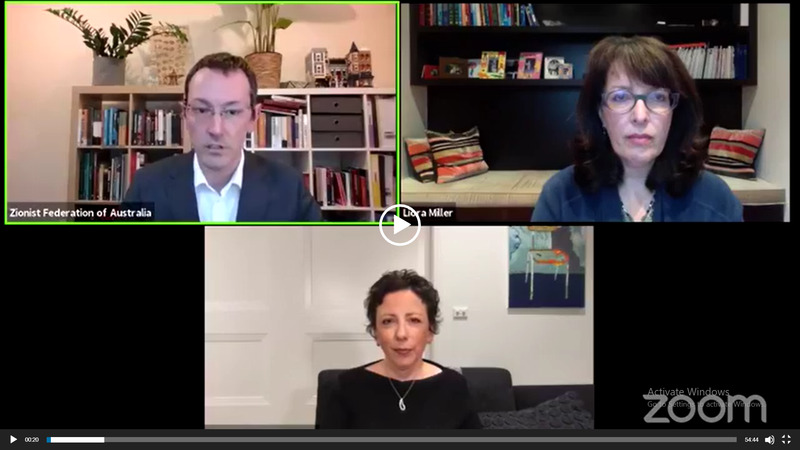 2020-04-21
2020-04-21Jewish Melbourne: "Second Generation Holocaust Survivor Triggers During The COVID 19 Crisis"
This is a video recording of a conversation between Liora Miller and Simone Szalmuk-Singer of Jewish Women of Words. It was hosted as well by the ZIonist Federation of Australia. -
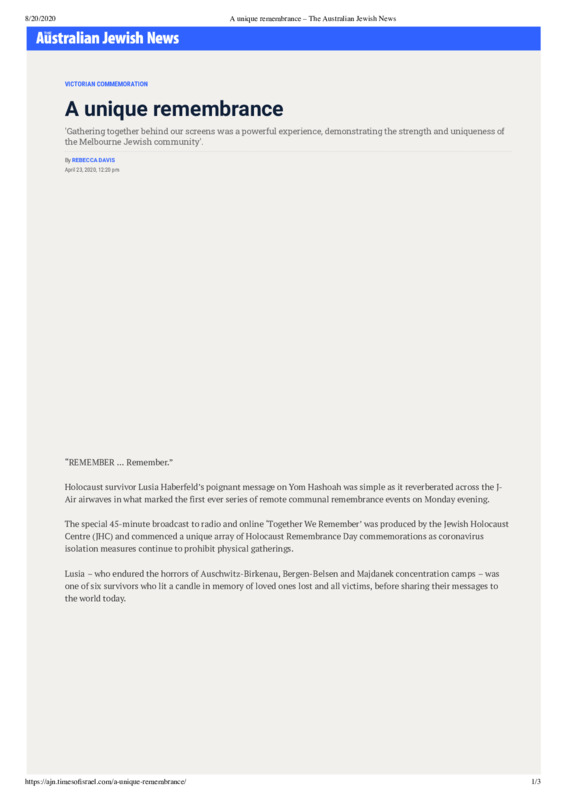 2020-04-23
2020-04-23Jewish Melbourne: AJN article 'A unique remembrance'
This article, written by Rebecca Davis and published on 23 April 2020, reports on the Yom Hashoah events held the previous day, all online because of the lockdown. Three events are reported on: "special 45-minute broadcast to radio and online ‘Together We Remember’ [which] was produced by the Jewish Holocaust Centre (JHC) and commenced a unique array of Holocaust Remembrance Day commemorations as coronavirus isolation measures continue to prohibit physical gatherings"; "Immediately following the J-Air broadcast, the interactive Zoom event ‘Turning Memory into Action’ was hosted by LaunchPad in partnership with the JHC"; and "Later in the evening, the Jewish Community Council of Victoria together with the JHC screened 13 survivor testimonies on YouTube." -
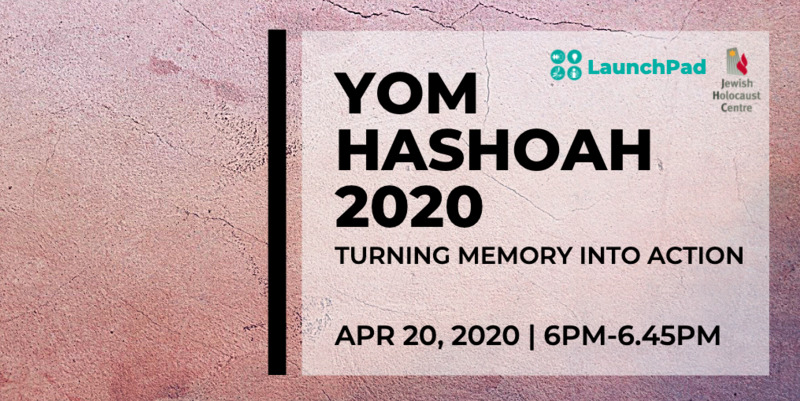 2020-04-20
2020-04-20Jewish Melbourne: LaunchPad Yom Hashoah event materials
Due to the pandemic, Yom Hashoah commemoration events, which would normally be held in person, needed to go online. On April 20, 2020, LaunchPad hosted an online, zoom-based, Yom Hashoah event which "consisted of an intergenerational conversation exploring the preservation of memory and the ways in which we can each be custodians of our family's stories." At the event there were three speakers: Phillip Maisel (Holocaust survivor), Suzy Zail (2nd Gen) and Julia Sussman (3rd Gen), moderated by Jennifer Levitt Maxwell. The event (which went for 45 minutes) also involved candle lighting. Everyone was encouraged to light a candle at home, and then six people were nominated to light 6 candles for the event, namely: Pauline Rockman OAM - co-president of the Jewish Holocaust Centre, Simone Szalmuk-Singer - co-chair of Australian Jewish Funders, Phil and Sue Lewis and their family - co-chair of the Jewish Holocaust Centres capital campaign, Helen Mahemoff - Board Director of the Jewish Holocaust Centre, Arek dybel - filmmaker and creative director at museum POLIN in Warsaw, and Andrea Lipshutz - representing LaunchPad’s ‘Regeneration Melbourne’ Committee. -
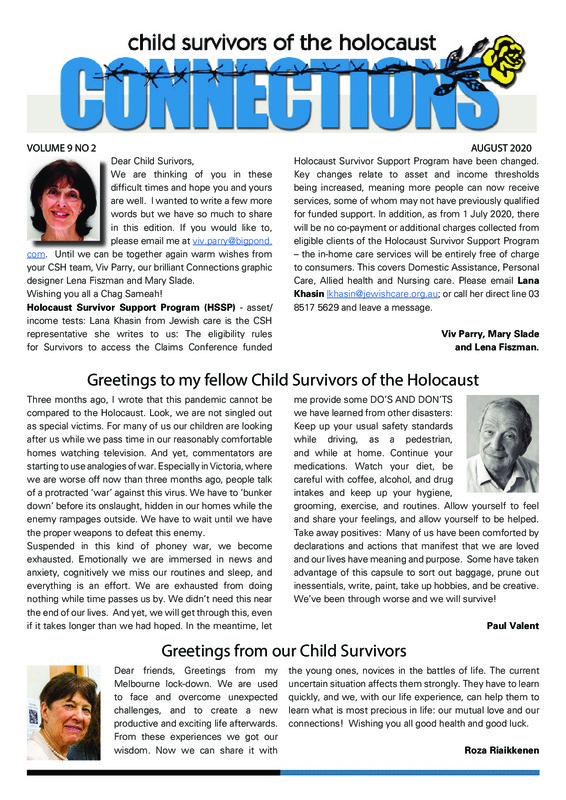 2020-08-19
2020-08-19Jewish Melbourne: writings by Child Survivors of the Holocaust during Covid times
This collection of writings was assembled by Viv Parry (Chairperson for the Child Survivors of the Holocaust Melbourne Group) for submission to the archive. It contains the following: 'A Point in Time', a recent article that Viv Parry was asked to write for the New Year Magazine for The Ark Synagogue, Hawthorn Connections (August 2020) is a newsletter edited by Viv Parry for the Child Survivors of the Holocaust (CSH) Melbourne Group. In this newsletter there are 9 individual contributions from CSH in answer to her personal request to "tell us how you are travelling at the moment during this unprecedented time?" Viv made no suggestions, asking only that they addressed the group (265 CSH members) and shared their thoughts at whatever level they found personally relevant to themselves. 'Child Survivors, Corona' is an article written by Dr Paul Valant's for Connections, published in April 2020. A second article on the topic appears in the August edition of the newsletter. An email from Stefanie Selzer, dated 31.7.2020. Stefanie is the World Federation Of Jewish Child Survivors of the Holocaust & Descendants N.Y, President and Claims Conference representative. Stefanie forwarded our Connections Newsletter to the other CSH groups in the US including Canada where Mark Elster felt compelled to reply (also included in the same document). These documents together create a story of a unique group of people who are supporting each other at this difficult time, with a remarkably positive attitude. -
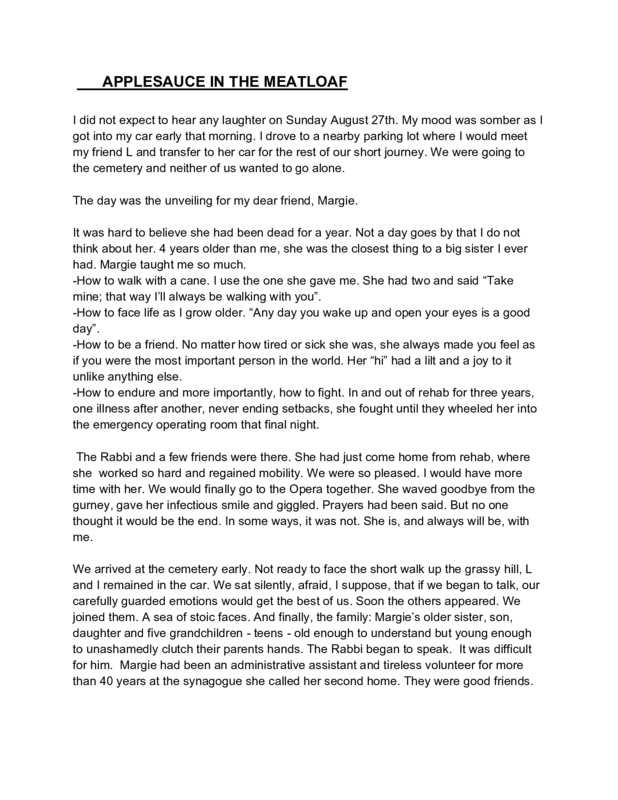 2018
2018Jewish Melbourne - Applesauce In The Meatloaf
An unveiling of a dear friend , an unexpected lesson learned, and the value of every day. -
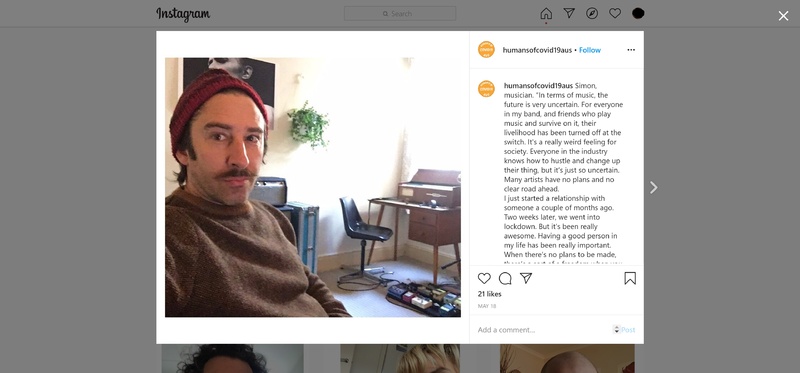 2020-05-18
2020-05-18Humans of Covid-19 AU: Simon
“In terms of music, the future is very uncertain. For everyone in my band, and friends who play music and survive on it, their livelihood has been turned off at the switch. It's a really weird feeling for society. Everyone in the industry knows how to hustle and change up their thing, but it’s just so uncertain. Many artists have no plans and no clear road ahead. I just started a relationship with someone a couple of months ago. Two weeks later, we went into lockdown. But it’s been really awesome. Having a good person in my life has been really important. When there’s no plans to be made, there’s a sort of a freedom when you can just focus on the day. It is nice to make everything small like that - focusing on the 14-16 waking hours and not expecting too much out of them. Simplicity has been getting me through this. The pot plants are getting a fair amount of attention...” Instagram post on Simon, musician, and his experience during the pandemic, which was created by a psychology student living in Melbourne who was interested to hear about how COVID-19 was impacting on different peoples’ lives. -
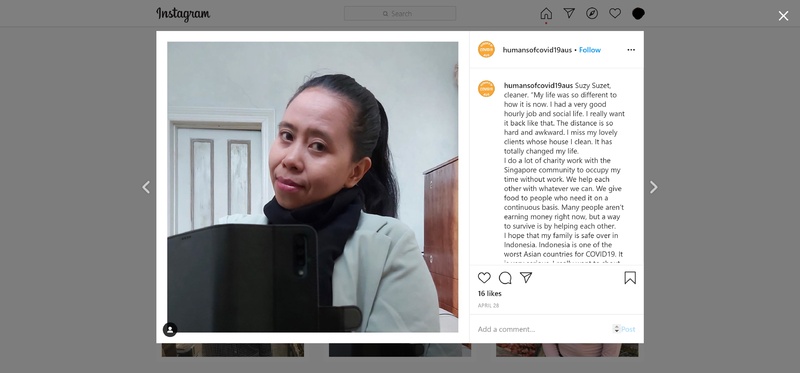 2020-04-28
2020-04-28Humans of Covid-19 AU: Suzy Suzet
“My life was so different to how it is now. I had a very good hourly job and social life. I really want it back like that. The distance is so hard and awkward. I miss my lovely clients whose house I clean. It has totally changed my life. I do a lot of charity work with the Singapore community to occupy my time without work. We help each other with whatever we can. We give food to people who need it on a continuous basis. Many people aren’t earning money right now, but a way to survive is by helping each other. I hope that my family is safe over in Indonesia. Indonesia is one of the worst Asian countries for COVID19. It is very serious. I really want to shout out to my people “this is the worst thing and listen to the government’s warnings!”. I always remind my family: stay at home. Don't worry about food or money, I will provide. Just don’t step outside the house. I really appreciate the Australian Government, they are doing the best. The cases have slowed down, and there has been a good response and togetherness from all of the people. We must always be aware of what the government is saying. Always listen and do it, it’s not that hard. This is not a holiday, lock down is lock down. I have to go outside to make money. The rest are very lucky to work from home.” Instagram post on Suzy Suzet, cleaner, and her experience during the pandemic, which was created by a psychology student living in Melbourne who was interested to hear about how COVID-19 was impacting on different peoples’ lives. -
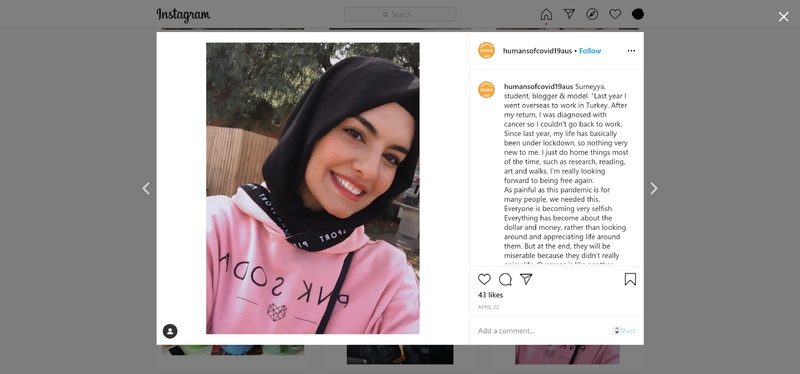 2020-04-22
2020-04-22Humans of Covid-19 AU: Sumeyya
“Last year I went overseas to work in Turkey. After my return, I was diagnosed with cancer so I couldn't go back to work. Since last year, my life has basically been under lockdown, so nothing very new to me. I just do home things most of the time, such as research, reading, art and walks. I’m really looking forward to being free again. As painful as this pandemic is for many people, we needed this. Everyone is becoming very selfish. Everything has become about the dollar and money, rather than looking around and appreciating life around them. But at the end, they will be miserable because they didn’t really enjoy life. Overseas is like another world, especially in poor countries. But no one stops to think about how these people are surviving. Ramaddan is in a few days' time. There is a mixture of excitement and nervousness. It will be hard because we can’t visit friends and family, or have meals together with lots of people. But a lot of people are working on keeping it positive. This year we can pray just with our family, and it is still rewarding. As hard as this time is, we are going to be part of history!” Instagram post on Sumeyya, student, blogger & model, and her experience during the pandemic, which was created by a psychology student living in Melbourne who was interested to hear about how COVID-19 was impacting on different peoples’ lives. -
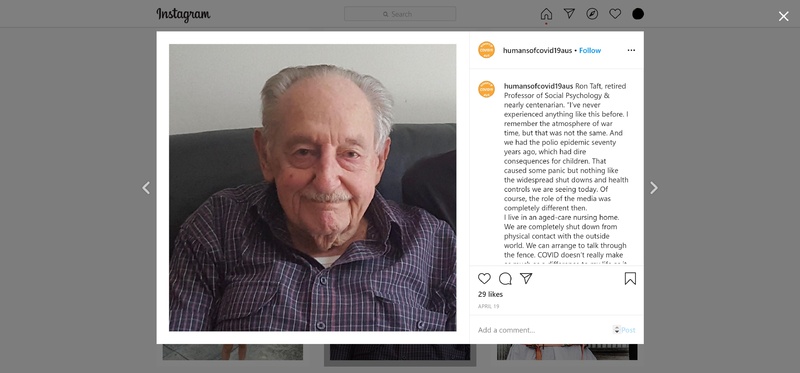 2020-04-19
2020-04-19Humans of Covid-19 AU: Ron Taft
“I’ve never experienced anything like this before. I remember the atmosphere of war time, but that was not the same. And we had the polio epidemic seventy years ago, which had dire consequences for children. That caused some panic but nothing like the widespread shut downs and health controls we are seeing today. Of course, the role of the media was completely different then. I live in an aged-care nursing home. We are completely shut down from physical contact with the outside world. We can arrange to talk through the fence. COVID doesn’t really make as much as a difference to my life as it does to younger people, who are used to being out and about. I’m actually having more communication now with family and friends than I had previously. Maybe the exceptional circumstances mean people want to reach out; could be having more time on one’s hands. Mobile phones are having a huge impact on people’s lives. I feel quite healthy. I survived a haematoma a couple of years ago. All going well, I turn 100 in about six weeks. The world has changed so very greatly over the century of my life.” Instagram post on Ron Taft, retired Professor of Social Psychology & nearly centenarian, and his experience during the pandemic, which was created by a psychology student living in Melbourne who was interested to hear about how COVID-19 was impacting on different peoples’ lives. -
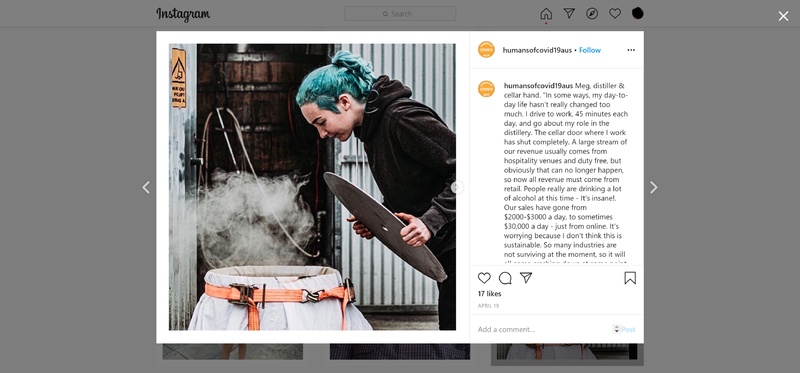 2020-04-19
2020-04-19Humans of Covid-19 AU: Meg
“In some ways, my day-to-day life hasn’t really changed too much. I drive to work, 45 minutes each day, and go about my role in the distillery. The cellar door where I work has shut completely. A large stream of our revenue usually comes from hospitality venues and duty free, but obviously that can no longer happen, so now all revenue must come from retail. People really are drinking a lot of alcohol at this time - It's insane!. Our sales have gone from $2000-$3000 a day, to sometimes $30,000 a day - just from online. It’s worrying because I don't think this is sustainable. So many industries are not surviving at the moment, so it will all come crashing down at some point, it’s just unclear when. Not being able to go out is not the end of the world. Social media is amazing in this sense. I’m managing to stay connected with my friends and family. Tuesday night is quiz night that my mum organises, then Wednesday night is family sit-down dinner. Last year I was in a car accident and it taught me that I needed to slow down and enjoy my life. And this is another reminder that I need to be grateful for everything happening around me. I have picked up hobbies that I had put aside for a while, because I didn’t have time. A lot more creativity is coming back into my life that I love and had really missed. People are being a lot more compassionate and supportive of each other. It has restored a little bit of my faith in humanity.” Instagram post on Meg, distiller & cellar hand, and her experience during the pandemic, which was created by a psychology student living in Melbourne who was interested to hear about how COVID-19 was impacting on different peoples’ lives. -
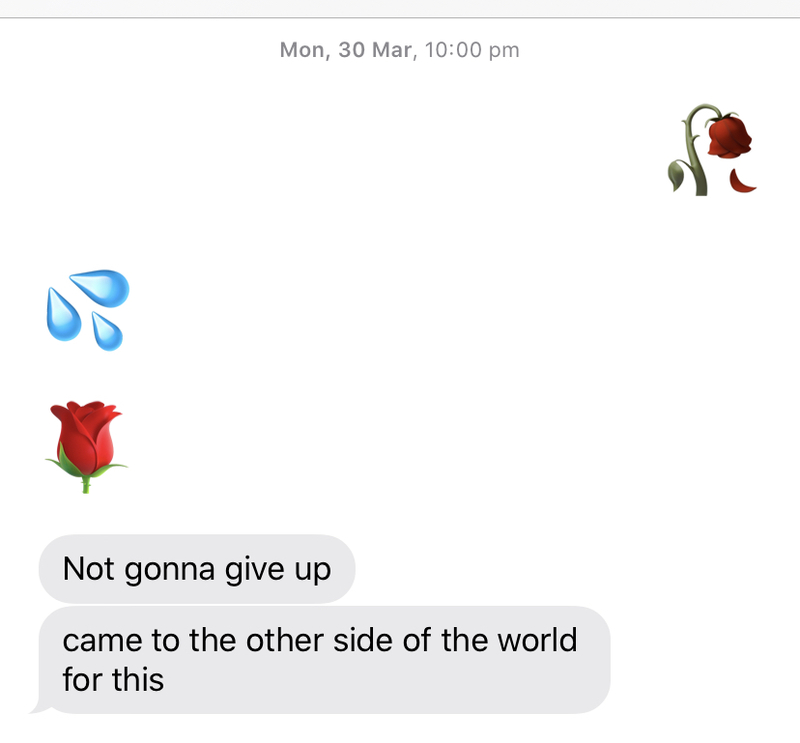 2020-06-19
2020-06-19A pandemic love story
I was only a month into dating a British guy here in Australia on a working holiday visa when the pandemic started affecting countries outside of China. The battle that China was facing at the time seemed far, far away, as if it could never reach us all the way here in Australia. For a lot of young people like myself, we continued our daily lives, a little anxious, alert but otherwise content with our circumstances. So far, we were free. At university, a friend once proclaimed, ‘it’s okay, even if we were to get it, for young people, it’s just like the common cold, which is another form of coronavirus anyway.’ Things progressed extremely fast of course. From announcement of the first identified case in Australia, it was a matter of people frantically tuning in to the news every single day and night, talking with neighbours and phoning relatives overseas as we eagerly awaited the next steps of prime minister Scott Morrison. At first, Australia was hesitant to respond, with Morrison and health officials calmly addressing the nation on news. But surely, as the number of cases in Australia grew from 1 to 30 to 150 by March 19, the borders shut, shops closed and we became housebound. Stage 1 restrictions had begun. It’s hard to believe that since then, I’ve completed an entire semester, 9 weeks of university, online. Just a few days before these restrictions began on March 19-20, my boyfriend and I, having only been dating 1 month, went through a rough patch causing me to break off the relationship. Then, once lockdown began, his workplace closed and he realised he had insufficient savings to last more than a month of rent and expenses in Melbourne. Being a UK citizen, he was also not entitled to the stream of government financial benefits that had recently initiated. He didn’t even have Medicare so if he were to suddenly fall ill, he wouldn't be able to afford basic medical care. After pouring his heart out to me about all this, I knew that the best thing for him was to fly back to the UK. In my mind, we were over and there was no reason for him to stay and suffer in Australia. However, stubbornly and against my advice, he insisted on staying if I gave him another chance because he wanted to resolve our issues and continue the relationship. He wanted to show me that he’s not the type of guy to leave when things get tough (bit dramatic, yes). He also knew that if he left, he wouldn’t be able to return to Australia, because of his type of visa. For him, there was literally no advantage in staying: no work, no savings, no family. All he had was me, and the prospect of our relationship. For whatever reason, he decided that that was worth fighting for, amid a global pandemic and financial hardship. After many long conversations back and forth, he convinced me that it was indeed possible for him to stay because he was willing to do whatever it took, even borrowing money from family, an idea that normally revolts him. Meanwhile, I realised I didn't want to give up on our relationship. I wanted him beside me, especially during this uncertainty. I knew that a guy willing to stay in a country for you, is a guy you only meet once in a lifetime. So, I gave him another chance and we fought to get through. For 2 months, this is what our lives looked like: - Him, cooped up in his apartment with his flatmates, playing videogames, applying for jobs here and there, checking for updates and praying that the government would offer any help to temporary visa holders - Me, cooped up in my suburban home, watching online lectures, bonding with my family, exercising, baking - Me, buying him food and groceries when I could - Us, Facetiming, every night, making each other laugh, planning all the things we’d do when restrictions lifted and addressing uncomfortable topics with a pandemic sense of urgency - Us, meeting up twice a week, spending the entire day together just driving around in my car, taking away food and coffee, feeding off each other’s presence in this lonely time - Us, without the hussle and bustle of ‘normal’ life, getting to know each other deeply and authentically. You can’t hide behind your work mask or your social mask during lockdown. Where we are now, 4 months later. We are going strong. Our issues are past us, and he has been nothing but amazing and supportive. He managed to find work again and received a rent grant. Financially, he has survived. Restrictions in Australia have lifted, restaurants are open for dine-in, sports matches are re-opening and groups of up to 20 can now gather in a home. Things are finally looking up. He is hoping to find farm work soon, which everyone on a working holiday visa must do in order to stay a second year. This whole experience has been surreal. This isn’t the first time the world has witnessed a pandemic but it’s certainly the first time entire countries have gone into lockdown. At the age of 22, I never thought my relationship would develop alongside a pandemic. I’m so grateful I’ve had someone to share this experience with. More importantly, I’ve learned that when an amazing thing or person comes into your life, to hold on and fight for it because at the end of the day, all we have is our health, and our love for people. -
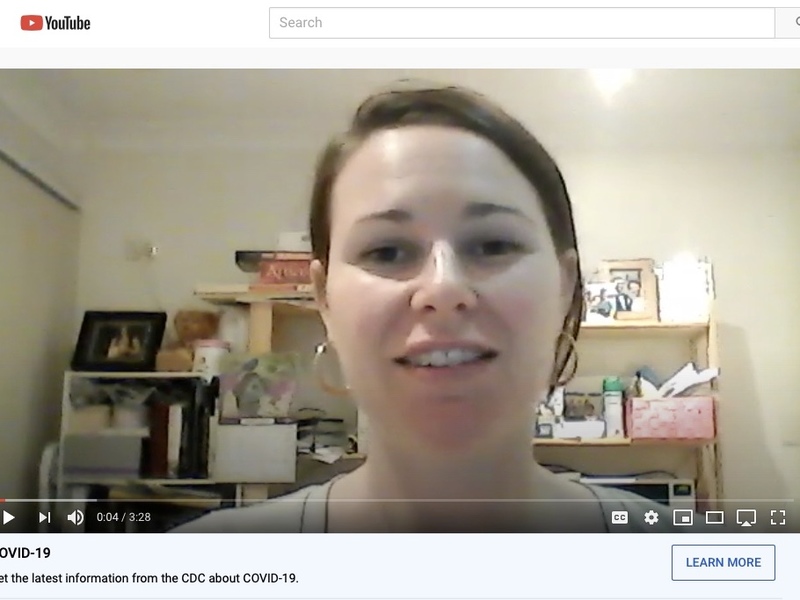 2020-03-24
2020-03-24Confessions of a COVID19 Survivor
Humorous recount
